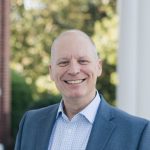LGBTQ+ advocates repeatedly call on churches to be “welcoming and affirming.” They join the two words at the hip and treat them as synonyms, or at least as a hendiadys. Just like “nice and warm,” or “sick and tired,” the two words “welcoming and affirming” are used together to express a single concept. In doing so, many advocates emphasize that Christians are not truly welcoming unless they are also affirming.
Let’s consider the example of our Lord. Clearly, he was welcoming. In first century Jewish thinking, tax collectors and prostitutes were the lowest members of society. The four Gospels give many examples of Jesus receiving tax collectors and prostitutes, associating with them, and at times interacting with them in scandalous ways (Luke 7:36-50). Our Savior’s example challenges churches to welcome transgender, gay, or bisexual individuals in ways we may find difficult and uncomfortable.
However, was Jesus “affirming”? Here the biblical witness is also quite clear. Jesus liberated tax collectors (Luke 19:8-9) and prostitutes (Mark 2:17; Matthew 21:32-33), and at times he delivered them from both the condemnation and the bondage of sin (John 8:11). Jesus offered the water of life freely to whomever would come, but he also set clear boundaries. In the Sermon on the Mount Jesus declares, “Enter through the narrow gate. For the gate is wide and the road broad that leads to destruction, and there are many who go through it. How narrow is the gate and difficult the road that leads to life, and few find it” (Matthew 7:13-14). While I am quick to agree with transgender proponents that Jesus’ warning applies to me just as much as it does to anyone in the LGBTQ+ community, the biblical record is unambiguous.Jesus welcomed everyone just as they were, but he also called all to leave everything, including their own way of life, behind to follow him. His call remains the same today. Jesus Christ was welcoming, but there is no evidence of him affirming an unbiblical lifestyle.
So the example provided by our Lord seems to be a model of welcoming, but not affirming. At times the difference between the two will be clear; at other times the distinction may be more difficult. When we are confronted by situations that seem gray, let’s be quick to seek godly advice and counsel. And when we see other brothers and sisters navigating the murky waters of problematic choices, let’s give our advice and encouragement with charity and grace. We cannot affirm what God has prohibited, but we must welcome every person as an image bearer for whom Christ died.






No comments have been added.